- Home
- William Golding
The Inheritors Page 2
The Inheritors Read online
Page 2
“You will sleep to-night by the falling water. It has not gone away. Do you remember?"
“I have a picture of the water and the cave."
Lok patted the dead tree affectionately and Mai led them upward. Now in their joy they also began to pay attention to his weakness, though they were not yet aware how deep it was. Mai lifted his legs like a man pulling them out of mud and his feet were no longer clever. They chose places of their own unskilfully, but as though something were pulling them sideways so that he reeled on his stick. The people behind him followed each of his actions easily out of the fullness of their health. Focused on his struggle they became an affectionate and unconscious parody. As he leaned and reached for his breath they gaped too, they reeled, their feet were deliberately unclever. They wound up through a litter of grey boulders and knees of stone until the trees fell away and they were out in the open.
Here Mai stopped and coughed and they understood that now they must wait for him. Lok took Liku by the hand.
“See!"
The slope led up to the gap and the mountain rose before them. On the left the slope broke off and fell down a cliff to the river. There was an island in the river which extended up as though one part had been stood on end and leaned against the fall. The river fell over on both sides of the island, thinly on this side but most widely and tremendously on that; and where it fell no man could see for the spray and the drifting smoke. There were trees and thick bushes on the island but the end towards the fall was obscured as by a thick fog and the river on either side of it had only a qualified glitter.
Mai started off again. There were two ways up to the lip of the fall; one zigzagged away to their right and climbed among the rocks. Although that way would have been easier for Mai he ignored it as though he were anxious above all things to reach comfort quickly. He chose then the path to the left. Here were little bushes which held them up on the edge of the cliff, and while they were threading these Liku spoke to Lok again. The noise of the fall took the life out of her words and left nothing of them but a faint sketch.
“I am hungry."
Lok smacked himself on the chest. He shouted so that all the people heard.
“I have a picture of Lok finding a tree with ears that grow thickly!”
“Eat, Liku."
Ha stood by them with berries in his hand. He poured .them out for Liku and she ate, burying her mouth in the food; and the little Oa lay uncomfortably under her arm. The food reminded Lok of his own hunger. Now they had left the dank winter cave by the sea and the bitter, unnatural tasting food of beach and salt marsh he had a sudden picture of good things, of honey and young shoots, of bulbs and grubs, of sweet and wicked meat. He picked up a stone and beat it on the barren rock by his head as presently he would beat on a likely tree.
Nil pulled a withered berry off the bush and put it in her mouth.
“See Lok beating a rock!"
When they laughed at him he clowned, pretending to listen to the rock and shouting.
“Wake up, grubs! Are you awake?" But Mai was leading them onward.
The top of the cliff leaned back a little so that instead of climbing over the jagged top they could skirt the sheer part over the river where it ran out of the confusion at the foot of the falls. The trail gained height at each step, a dizzy way of slant and overhang, of gap and buttress where roughness to the foot was the only safety and the rock dived back under, leaving a void of air between them and the smoke and the island. Here the ravens floated below them like black scraps from a fire, the weed-tails wavered with only a faint glister over them to show where the water was: and the island, reared against the fall, interrupting the sill of dropping water, was separate as the moon. The cliff leaned out as if looking for its own feet in the water. The weed-tails were very long, longer than many men, and they moved backwards and forwards beneath the climbing people as regularly as the beat of a heart or the breaking of the sea.
Lok remembered how the ravens sounded. He flapped at them with his arms.
“Kwak!"
The new one stirred on Fa's back, shifting the grip of his hands and feet. Ha was going very slowly for his weight made him cautious. He crept along, hands and feet flexing and contracting on the slanting rock. Mai spoke again.
“Wait."
They read his lips as he turned to them and gathered in a group at his side. Here the trail expanded to a platform with room for them all. The old woman rested her hands on the slanting rock so that the weight was eased for her. Mai bent down and coughed till his shoulders were wrenched. Nil squatted by him, put one hand on his belly and the other on his shoulder.
Lok looked away over the river to forget his hunger. He flared his nostrils and immediately was rewarded with a whole mixture of smells, for the mist from the fall magnified any smell incredibly, as rain will deepen and distinguish the colours of a field of flowers. There were
the smells of the people too, individual but each engaged to the smell of the muddy path where they had been.
This was so concretely the evidence of their summer quarters that he laughed for joy and turned to Fa, feeling that he would like to lie with her for all his hunger. The rain-water from the forest had dried off her and the curls that clustered round her neck and over the new one's head were glossy red. He reached out his hand to her breast so that she laughed too and patted her hair back from her ears.
“We shall find food," he said with all of his wide mouth, "and we shall make love."
Mentioning food made his hunger as real as the smells. He turned again outwards to where he smelt the old woman's burden. Then there was nothing but emptiness and the smoke of the fall coming towards him from the island. He was down, spread-eagled on the rock, toes and hands gripping the roughness like limpets. He could see the weed-tails, not moving but frozen in an instant of extreme perception, beneath his armpit. Liku was squawking on the platform and Fa was flat by the edge, holding him by the wrist, while the new one struggled and whimpered in her hair. The other people were coming back. Ha was visible from the loins up, careful but swift and now leaning down to his other wrist. He felt the sweat of terror in their palms. A foot or a hand at a time he moved up until he was squatting on the plat- form. He scrambled round and gibbered at the weedtails that were moving again. Liku was howling. Nil bent down and took her head between her breasts and stroked the curls down her back soothingly. Fa pulled Lok so that he faced her.
“Why?"
Lok knelt for a moment, scratching in the hair under his mouth. Then he pointed into the damp spray that was drifting at them across the island.
“The old woman. She was out there. And it."
The ravens were rising under his hand as the air poured up the cliff. Fa took her hand away from him when his man's voice touched the matter of the old woman. But Lok's eyes stayed on her face.
“She was out there!”
Complete incomprehension silenced them both. Fa was frowning again. She was not a woman to lie with. Something of the old woman was invisibly present in the air round her head. Lok implored her.
“I turned to her and fell." Fa closed her eyes and spoke austerely.
“I do not see this picture."
Nil was leading Liku after the others. Fa followed them as if Lok did not exist. He clambered after her sheepishly aware of his mistake; but as he went he murmured:
“I turned to her."
The others had gathered in a group farther along the path. Fa shouted to them.
“We are coming!" Ha shouted back:
“There is an ice woman."
Beyond and above Mai there was a gully in the cliff loaded with old snow that the sun had not reached. Weight and cold and then the pelting rain of late winter had compacted the snow into ice that hung perilously and water ran out between the melting edge and the warmer rock. Though they had never seen an ice woman still left in this gully when they came back from their winter cave by the sea, the thought did not occur to them that Mai had taken them
into the mountains too early. Lok forgot his escape and the strange indefinable newness of the spray-smell and ran forward. He stood by Ha and shouted:
“Oa! Oa! Oa!" Ha and the others shouted with him.
“Oa! Oa! Oa!"
Over the insistent drumming of the fall their voices were puny and without resonance, yet the ravens heard and faltered, then glided smoothly once more. Liku was Shouting and waving the little Oa, though she did not know why. The new one woke again, passed a pink tongue over his lips like a kitten and peered out from the curls by Fa's ear. The ice woman hung above and beyond them. Though the deadly water still trickled from her belly, she would not move. Then the people were silent and passed swiftly till she was hidden by the rock. They came without speech to the rocks by the fall where the huge cliff looked down for its feet in the turbulence and smother of white water. Almost on a level with their eyes was the clear curve where the water turned down over the sill, water so clear that they could see into it. There were weeds, not moving with slow rhythm but shivering madly as though anxious to be gone. Near the fall the rocks were wet with spray and ferns hung out over space. The people hardly glanced at the fall but pressed on quickly.
Above the fall the river came through a gap in the range of mountains.
Now that the day was almost done the sun lay in the gap and dazzled from the water. Across the water the current slid by sheer mountain that was black and hidden from the sun; but this side of the gap was less uncompromising. There was a slanting shelf, a terrace that gradually became a cliff. Lok ignored the unvisited island and the mountain beyond it on the other side of the gap. He began to hurry after the people as he remembered how safe the terrace was. Nothing could come at them out of the water because the current would snatch it over the fall; and the cliff above the terrace was for foxes, goats, the people, hyenas and birds. Even the way down from the terrace to the forest was defended by an entry so narrow that one man with a thorn bush could hold it. As for this trail on the sheer cliff above the spray pillars and the confusion of waters, it was worn by nothing but the feet of the people.
When Lok edged round the corner at the end of the trail the forest was already dark behind him, and shadows were racing through the gap towards the terrace. The people relaxed noisily on the terrace but then Ha swung his thorn bush so that the prickly head lay on the ground before him. He bent his knees and sniffed the air. At once the people were silent, spreading in a semicircle before the overhang. Mai and Ha stole forward, thorn bushes at the ready, moved up a little slope of earth until they could look down into the overhang.
But the hyenas had gone. Though the scent clung to the scattered stones that had dropped from the roof and the scanty grass that grew in the soil of generations, it was a day old. The people saw Ha lift his thorn bush until it was no longer a weapon and relaxed their muscles.
They moved a few paces up the slope and stood before the overhang .while the sunlight threw their shadows sideways. Mai quelled the cough that rose from his chest, turned to the old woman and waited. She knelt in the overhang and laid the ball of clay in the centre of it. She opened the clay, smoothing and patting it over the old patch that lay there already. She put her face to the clay and breathed on it. In the very depth of the overhang there were recesses on either side of a pillar of rock and these were filled with sticks and twigs and thicker branches. She went quickly to the piles and came again with twigs and leaves and a log that was fallen almost to powder. She arranged this over the opened clay and breathed till a trickle of smoke appeared and a single spark shot into the air. The branch cracked and a flame of amethyst and red coiled up and straightened so that the side of her face away from the sun was glowing and her eyes gleamed. She came again from the recesses and put on more wood so that the fire gave them a brilliant display of flame and sparks. She began to work the wet clay with her fingers, tidying the edges so that now the fire sat in the middle of a shallow dish. Then she stood up and spoke to them.
“The fire is awake again."
TWO
At that the people talked again excitedly. They hurried into the hollow. Mai crouched down in between the fire and the recess and spread out his hands, while Fa and Nil brought more wood and placed it ready. Liku brought a branch and gave it to the old woman. Ha squatted against the rock and shuffled his back till it fitted. His right hand found a stone and picked it up. He showed it to the people.
“I have a picture of this stone. Mai used it to cut a branch. See! Here is the part that cuts."
Mai took the stone from Ha, felt the weight, frowned a moment, then smiled at them.
“This is the stone I used," he said. "See! Here I put my thumb and here my hand fits round the thickness." He held up the stone, miming Mai cutting a branch.
“The stone is a good stone," said Lok. "It has not gone away. It has stayed by the fire until Mai came back to it."
He stood up and peered over the earth and stones down the slope. The river had not gone away either or the mountains. The overhang had waited for them. Quite suddenly he was swept up by a tide of happiness and exultation. Everything had waited for them: Oa had waited for them. Even now she was pushing up the spikes of the bulbs, fattening the grubs, reeking the smells out of the earth, bulging the fat buds out of every crevice and bough. He danced on to the terrace by the river, his arms spread wide.
“Oa!"
Mai moved a little way from the fire and examined the back of the overhang. He peered at the surface and swept a few dried leaves and droppings from the earth at the base of the pillar. He squatted and shrugged his shoulders into place.
“And this is where Mai sits."
He touched the rock gently as Lok or Ha might touch Fa.
“We are home!"
Lok came in from the terrace. He looked at the old woman. Freed from the burden of the fire she seemed a little less remote, a little more like one of them. He could look her in the eye now and speak to her, perhaps even be answered. Besides, he felt the need to speak, to hide from the others the unease that the flames always called forth in him.
“Now the fire sits on the hearth. Do you feel warm Liku?" Liku took the little Oa from her mouth.
“I am hungry."
“To-morrow we shall find food for all the people." Liku held up the little Oa.
“She is hungry too."
“She shall go with you and eat." He laughed round at the others.
“I have a picture!”
Then the people laughed too because this was Lok's picture, almost the only one he had, and they knew it as well as he did, a picture of finding the little Oa."
Fantastically the old root was twisted and bulged and smoothed away by age into the likeness of a great-bellied woman.
“I am standing among the trees. I feel. With this foot I feel!” He mimed for them. His weight was on his left foot and his right was searching in the ground.
“I feel. What do I feel? A bulb? A stick? A bone?" His right foot seized something and passed it to up his left hand. He looked. "It is the little Oa!" Triumphantly he sunned himself before them. "And now where Liku is there is the little Oa."
The people applauded him, grinning, half at Lok, half at the story. Secure in their applause, Lok settled him- self by the fire and the people were silent, gazing into the flames.
The sun dropped into the river and light left the overhang. Now the fire was more than ever central, white ash, a spot of red and one flame wavering upwards The old woman moved softly, pushing in more wood so that the red spot ate and the flame grew strong. The people watched, their faces seeming to quiver in the unsteady light. Their freckled skins were ruddy and the deep caverns beneath their brows were each inhabited by replicas of the fire and all their fires danced together. As they persuaded themselves of the warmth they relaxed limbs and drew the reek into their nostrils gratefully. They flexed their toes and stretched their arms, even leaning away from the fire. One of the deep silences fell on them, that seemed so much more natural than s
peech, a timeless silence in which there were at first many minds in the overhang; and then perhaps no mind at all. So fully discounted was the roar of the water that the soft touch of the wind on the rocks became audible. Their ears as if endowed with separate life sorted the tangle of tiny sounds and accepted them, the sound of breathing, the sound of wet clay flaking and ashes falling in. Then Mai spoke with unusual diffidence.
“It is cold?"
Called back into their individual skulls they turned to him. He was no longer wet and his hair curled. He moved forward decisively and knelt so that his knees were on the clay, his arms as supports on either side and the full heat beating on his chest. Then the spring wind flicked at the fire and sent the thin column of smoke straight into his open mouth. He choked and coughed. He went on and on, the coughs seeming to come out of his chest without warning or consultation. They threw his body about and all the time he gaped for his breath. He fell over sideways and his body began to shake. They could see his tongue and the fright in his eyes. The old woman spoke.

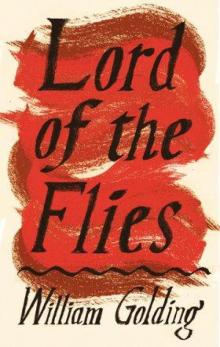 Lord of the Flies
Lord of the Flies To the Ends of the Earth
To the Ends of the Earth Free Fall
Free Fall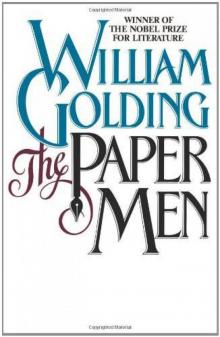 The Paper Men
The Paper Men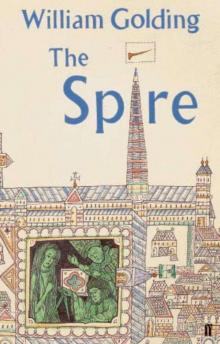 The Spire
The Spire The Scorpion God: Three Short Novels
The Scorpion God: Three Short Novels The Inheritors
The Inheritors Darkness Visible: With an Introduction by Philip Hensher
Darkness Visible: With an Introduction by Philip Hensher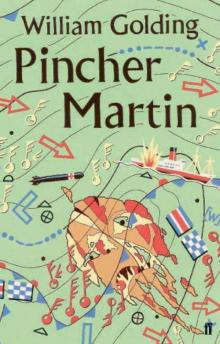 Pincher Martin
Pincher Martin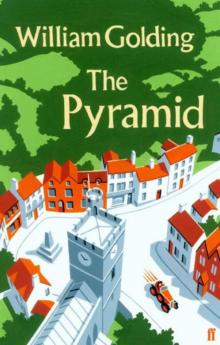 The Pyramid
The Pyramid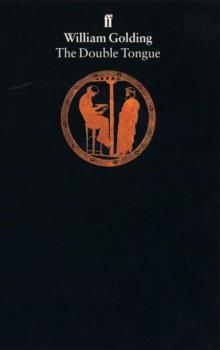 The Double Tongue
The Double Tongue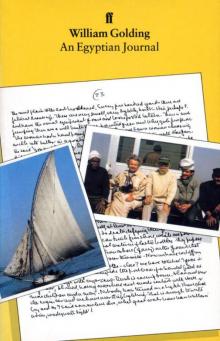 An Egyptian Journal
An Egyptian Journal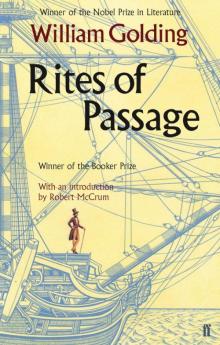 Rites of Passage
Rites of Passage Envoy Extraordinary
Envoy Extraordinary